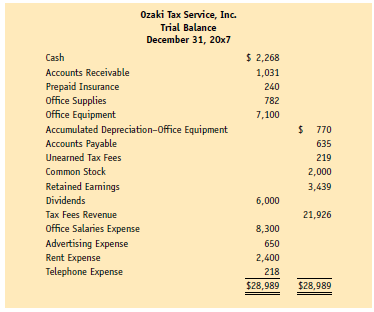Determining Adjusting Entries and Tracing Their Effects to Financial Statements
Joyce Ozaki opened a small tax-preparation service. At the end of its second year of operation, Ozaki Tax Service, Inc., had the trial balance shown at the top of the next page. The following information is also available:
a. Office supplies on hand, December 31, 20×7, $227.
b. Insurance still unexpired, $120.
c. Estimated depreciation of office equipment, $770.
d. Telephone expense for December, $19; the bill was received but not recorded.

e. The services for all unearned tax fees had been performed by the end of the year.
f. Estimated federal income taxes for the year, $1,800.
Required
1. Open T accounts for the accounts in the trial balance plus the following: Income Taxes Payable; Insurance Expense; Office Supplies Expense; Depreciation Expense–Office Equipment; and Income Taxes Expense. Record the balances shown in the trial balance.
2. Determine the adjusting entries and post them directly to the T accounts.
3. Prepare an adjusted trial balance, an income statement, a statement of retained earnings, and a balance sheet.
4. User insight: Why is it not necessary to show the effects of the above transactions on the statement of cash flows?

